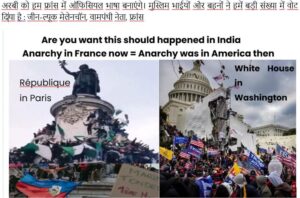
In the G-20 logo, the lotus flower depicting our faith and intellect, ‘Vasudhaiva Kutumbakam’ #vasudhaivkutumkam The spirit we have been living by, is included in the theme as well – PM @narendramodi

,G20 ,g20.org
PM @narendramodi while unveiling the logo of G-20 said that the lotus flower in it is portraying India’s mythological heritage, our faith and our intellectuality. In our place, the contemplation of Advaita has been the vision of the unity of the living being. Let this philosophy become the means of solving today’s global conflicts and dilemmas, we have given this message through this logo and theme. He said that through the G-20, India is giving new energy to the global prestige of Buddha’s message for freedom from war, Mahatma Gandhi’s solution to resist violence. The spirit of universal brotherhood that we have been living through the mantra of #vasudhaivkutumkam, that thought is being reflected in this logo and theme.
India Of Thinking And Affordability From World To Familiar to make Our Responsibility
PM Modi said that it is true that whenever there is a conference of big platforms like G-20 in the world, it has its own diplomatic and geo-political significance. This is also natural. But this summit is not just a diplomatic meeting for India. India sees this as a new responsibility for itself and the world’s faith in itself. Today, there is an unprecedented curiosity in the world to know India, to understand India. India is being studied in a new light, our present successes are being assessed. Along with this, unprecedented hopes are being expressed about our future. In such a situation, it is the responsibility of our countrymen to do much better than these hopes and expectations. It is our responsibility to introduce the world to India’s thinking and potential, India’s culture and social power.
Atal ji’s poem: Hindu body-mind, Hindu life, Hindu every vein My introduction
#UK PM @RishiSunak keeping Lord Ganesha’s idol on his desk and worshiping cow
Rishi Sunak was sworn in as Finance Minister in the year 2020
During this he took the oath by placing his hand on the Bhagavad Gita.
He once said, ‘India is my religious and cultural heritage’
Rishi Sunak was administered the oath of Finance Minister. During this, he took the oath by placing his hand on the Bhagavad Gita and became the favorite of every Indian. When a British newspaper asked him on this, he said in his own style, ‘I am a UK citizen now but my religion is Hindu. India is my religious and cultural heritage. I can proudly say that I am a Hindu and being a Hindu is my identity. Sunak, who keeps a statue of Lord Ganesha on his desk, has also appealed to give up beef on religious grounds. He himself does not consume beef. Sages don’t even drink alcohol.
I am the great teacher of the whole world, I give the gift of knowledge.

I showed the path of liberation, I taught the knowledge of Brahman.
The knowledge of my Vedas is immortal, the light of my Vedas is intense.
Can the darkness of human mind ever stand in front of you?
My voice echoes in the sky, echoes in the waters of the ocean.
From this corner to that corner, the sun can shine.
Hindu body-mind, Hindu life, Hindu in every vein, my introduction!
I am a bright beam, I spread light in the dark world.
Destruction by creating the world, when did you want your own development?
I have protected the refugee by giving my life.
If you don’t believe, then this history is immortal.
If today the ruins of Delhi wake up from sleep of centuries.
‘Hindu ki Jai’ hummed loudly, so what is the wonder?
Hindu body-mind, Hindu life, Hindu in every vein, my introduction!
G-20 theme is also hidden in this poem of Atal ji Theme of G-20 Bharat 23 India logo

1857 Revolution: The British lied to the worldVeer Savarkar told the first national freedom struggle
The Revolution of 1857 is an important event, which has earned the status of a watershed in history. Revolutionary and thinker Vinayak Damodar Savarkar in his classic book ‘The Independence Summer of 1857’ on the Revolution of 1857 named this revolution as India’s ‘First National War of Independence’.
From the first incident of 1857 till the last breath, the struggle of the Indian soldiers fighting for freedom was thrown into the eyes of the world by the British by calling it the Sepoy Mutiny. Had Veer Savarkar not been there, the revolution of 1857 would have been seen from the point of view of the British even today. It was he who put forward the reality of this revolution and established it as the first Indian freedom struggle.
The revolution of 1857 was so wide and intense in its impact and scope that it almost discouraged the British. The aspirations of his heart to rule India forever had vanished.
In 1857, the spark of revolution was blazing everywhere in the country. This spark was being given full air by the revolutionaries, but to make this spark a wave, it was necessary that the common citizens should join this movement.
Maharani Lakshmibai chose two symbols to convey the message of revolution to the people. These symbols were roti and blooming lotus.
It was difficult for the British to think that roti and lotus could be a symbol of revolution. When people took bread and lotus to each other’s house, the message of revolution reached every house. This bread and lotus did wonders and then together all the revolutionaries attacked the English army.
The first freedom struggle of 1857 was sometimes named as ‘peasant rebellion’ and sometimes as ‘soldier rebellion’, but in reality it was a well-planned campaign. ‘Roti’ and ‘Kamal’ were the specialties of this campaign. According to Kanpur’s senior historian Manoj Kapoor, Nana Saheb Peshwa’s strategist Tatya Tope executed it very skillfully and the officials of the East India Company were surprised. They could not understand the implication of lotus and roti.
Naveen Chand Patel told that there was an important reason behind choosing bread and lotus. Bread was the proof that you have to keep food and logistics ready for yourself because there was no place for how long the war would last. Similarly the lotus was chosen as a symbol of happiness and prosperity. Through this the message was conveyed that if the war was fought with full force, the British would be chased away and happiness and prosperity would return. Today we remember the revolution of 1857 as the miracle done by the pair of roti and lotus.
Tags: UK PM Rishi Sunak, G-20 Logo Theme, Kamal Flower, Vasudhaivkutumkam, Narendra Modi, Buddha Message, Atal Bihari Vajpayee poem, Hindu Tanman Hindu jivan, 1857 kamal roti
By – Premendra Agrawal @premendraind




